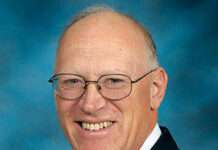Stress in America: K-State health expert discusses mental health impacts of pandemic
46% of adults do not feel comfortable going back to living life like they used to before the pandemic
MANHATTAN, Kan. – A new report from the American Psychological Association indicates that most U.S. adults are surprised that the COVID-19 pandemic has lasted so long.
The APA’s report on Stress in America found that 82% of American adults are surprised that the pandemic has lasted more than a year. Nearly 7 in 10 (67%) said that living through the pandemic has been a rollercoaster of emotions.
And Elaine Johannes, the Kansas Health Foundation Distinguished Professor of Community Health at Kansas State University, said 46% of adults do not feel comfortable going back to living life like they used to before the pandemic
“It’s amazing that this has gone on more than a year,” Johannes said. “So, it’s not surprising that so many are re-evaluating and wondering what’s next as they re-enter community life.
“It’s hard for us to deal with. Usually we can acclimate to a sudden trauma, grief or loss. With the help of our friends or family, we can move on. But these repeated ups and downs …it’s been tough.”
Johannes noted that many adults likely have gone through stages of shock, denial, sadness and grief and, eventually, acceptance.
“But some of the research around grief and change and how we feel about that has added another perspective, a sixth stage of meaning.” Johannes said. “This is where we feel like we have to have meaning assigned to (the occurrence). I think that’s where our emotions are right now. We’re asking ourselves, ‘what do we do now,’ ‘how do we recover knowing that we can’t go back to the way life was’ or ‘what’s the meaning that we can take away from this pandemic, even though it’s still going on.’”
Johannes said there is evidence that indicates Americans 100 years ago dealt with the same emotions during the Spanish Flu pandemic. During that time, there was also political unrest, doubts about the proper way forward and many deaths. That incident also showed that the ripple effects were felt for many years after.
“As a society, we need to be ready to re-acclimate (after the COVID-19 pandemic), redefine what our recovery is and reflect on what we gained from it,” Johannes said. “We can’t just go back to ‘normal’ because we will never be the same again.”
Work that has been done to address disaster-related psychological trauma has led to strategies that aid in recovery. Those include adapting to a different normal; feeling a sense of some control over our emotions; gaining perspective and assigning meaning to the losses; and feeling mastery from the experience.
Johannes punctuated her point by recalling a saying from President Harry S. Truman: ‘The reward of suffering is experience.’
“That, to me, kind of gives an understanding that the suffering and loss is real, and the sadness is authentic,” she said. “But, what can we gain from that? I think we can say that we are wiser and we have this experience to guide us in the future.”
Johannes added that the APA report highlighted an important point that Americans shared the experience as “a true community.”
“No matter where we were, Americans realized this was a tough, tough thing to go through,” she said. “We felt this roller coaster, up and down, not being sure what was next…But, as a group, we were still a community.”
A full interview with Johannes on the mental health aspects of living through the pandemic is available on the weekly radio program, Sound Living, produced by K-State Research and Extension.
FOR PRINT PUBLICATIONS: Links used in this story
K-State Research and Extension local offices, https://www.ksre.k-state.edu/about/stateandareamaps.html
APA Report: Stress in America, https://www.apa.org/news/press/releases/stress/2021/one-year-pandemic-stress-conclusion
APA Psychological First Aid Resources,
https://www.apa.org/practice/programs/dmhi/psychological-first-aid/resources
Sound Living, https://www.ksre.k-state.edu/news/radio-network/sound-living.html
K State Research and Extension is a short name for the Kansas State University Agricultural Experiment Station and Cooperative Extension Service, a program designed to generate and distribute useful knowledge for the well being of Kansans. Supported by county, state, federal and private funds, the program has county extension offices, experiment fields, area extension offices and regional research centers statewide. Its headquarters is on the K State campus in Manhattan. For more information, visit www.ksre.ksu.edu. K-State Research and Extension is an equal opportunity provider and employer.
Story by:
Pat Melgares
785-532-1160
melgares@ksu.edu
For more information:
Elaine Johannes
785-532-7720
ejohanne@ksu.edu





